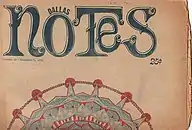Dallas Notes
Dallas Notes was a biweekly underground newspaper published in Dallas, Texas from 1967 to 1970, and edited by Stoney Burns (penname of Brent Lasalle Stein; 1942–2011), whose father owned a printing company in Dallas. Initially founded by Doug Baker[1] at Southern Methodist University in March 1967, under the title NOTES from the Underground, the first issues were run off after hours on a copy machine at Texas Instruments.[2][3]

History
With a blend of New Left political activism, hippie/drug counterculture, and underground comix and graphics, the paper developed a growing citywide and regional readership, and starting with Vol. 1, No. 26 (Feb. 16-29, 1968) the paper changed its banner to Dallas Notes and is sometimes confused with the competing weekly publication published by Doug Baker, first called "Dallas News", later, when the U.S. Post Office delivered their mail to "The Dallas Morning News" and the big morning paper's mail to them, Baker renamed it "The Iconoclast". Eventually circulation peaked at 20,000 copies after Stony Burns quit. Roy Appleton wrote in the Dallas Morning News that Dallas Notes "covered the local scene — from music and drug arrests to demonstrations and the men in blue." He reported that the paper "decried war, intolerance and hypocrisy with a playful aggression and a cutting edge."[4]
The paper's 85-issue run came to an end with the issue of Sept. 16-30, 1970. It was subsequently revived and carried forward under the name H.O.O.K.A. (The Humanitarian Order of Kosmic Awareness, organized as a church, whose purpose was the overthrow of the U.S. Government). When Stoney Burns left, citing he'd "dropped acid and flipped out three times, but only came back twice," he introduced J.R. Compton to the staff as the new editor and publisher, from late 1970 to 1972.
During its existence Dallas Notes was subjected to repeated police raids and harassment. Thorne Dreyer wrote at The Rag Blog that Notes editor Burns "was incessantly harassed by the Dallas authorities, who charged him with obscenity, beat him mercilessly, tore up his offices, and confiscated his equipment." Burns later learned that many of the office tear-ups and equipment thefts were carried out by his father and his father's trusted assistant.
The obscenity case against the paper "went all the way to the U.S. Supreme Court where Justice William O. Douglas commented on the cops' ransacking of the Dallas Notes offices: 'It would be difficult to find in our books a more lawless search-and-destroy raid.'"[5]
In a widely publicized case former editor Burns was sentenced to prison in 1972 for 10 years and a day for possession of marijuana,[6] but the sentence was commuted by Texas Governor Dolph Briscoe. Time magazine reported that, "The law in Dallas, from all appearances, had been bent on getting Stoney Burns for years."[7]
In his book, Unamerican Activities: The Campaign Against the Underground Press, Geoffrey Rips wrote that the "persistent persecution of Burns stemmed in part from [his] 1967 investigative report in Dallas Notes about Texas Congressman Joe Pool's arrest for drunken driving, after his car hit a carload of soldiers at a red light." Pool was released and the arrest records destroyed, and the story was ignored by the Dallas daily newspapers. Pool, who was a member of the House Un-American Activities Committee, called for an investigation of the underground papers.[8]
In October 1972, Burns, founded Buddy magazine, a free bi-monthly named after Buddy Holly that covered, among other things, the rock-n-roll and blues scene in North Texas.
Library access
- Dallas Notes – "Serving the proletariat since 1967," Notes from the Underground, Inc.; OCLC 14584184, 1049750530, 917535901
- Notes From the Underground; OCLC 869478328
- Notes on Pot; OCLC 8227105
- Hooka (Humanitarian Order of Kosmic Awareness); OCLC 14094691
- Hooka Notes (Humanitarian Order of Kosmic Awareness); OCLC 974432136
- Instant Karma (Humanitarian Order of Kosmic Awareness, Publishers of Hooka); OCLC 900010644
Notes
- "Oral History Interview With Doug D. Baker, Jr., 1998 October 29 & 30", interviewed by Bonnie Lovell; OCLC 319177710
- "Stoney Burns and Dallas Notes: Covering the Dallas Counterculture, 1967–1970" (Master of Arts thesis, history), by Bonnie Alice Lovell, University of North Texas (1999); OCLC 43299591, 928059863
- "Oral History Interview With Brent Lasalle Stein "Stoney' Burns", 1998 April 28," interviewed by Bonnie Lovell; OCLC 317394351
- "Stoney Burns, leading voice of the 1960s Dallas counterculture, dies at 68" by Roy Appleton, Dallas Morning News, April 29, 2011.
- "Stoney Burns dies at 68: Crusading underground journalist was incessantly harassed by Dallas officials" by Thorne Webb Dreyer, The Rag Blog, May 2, 2011.
- "Dallas activists in 1960s struggled against status quo in a time of tumult, change" by Roy Appleton, Dallas Morning News, October 25, 2008. Retrieved July 27, 2010.
- "Justice: Getting Stoney Burns", Time (magazine), November 25, 1974.
- Unamerican Activities: The Campaign Against the Underground Press, compiled by Geoffrey Rips, City Lights Books (1981), pps. 107–8; OCLC 65614029, 251710773Note: Rips (né Geoffrey Keith Rips; born 1950) is, among other things, a former editor of the Texas Observer
External links
- Dallas Underground Icon Stoney Burns Dead at 68. Articles by Thorne Dreyer and James McEnteer, The Rag Blog (May 2, 2011)]
- "Stoney Burns Was Dallas' Underground Iconoclast", by Tom Miller, The Rag Blog (May 20, 2011)
- "JUSTICE: Getting Stoney Burns", Time Magazine (Nov. 24, 1974)